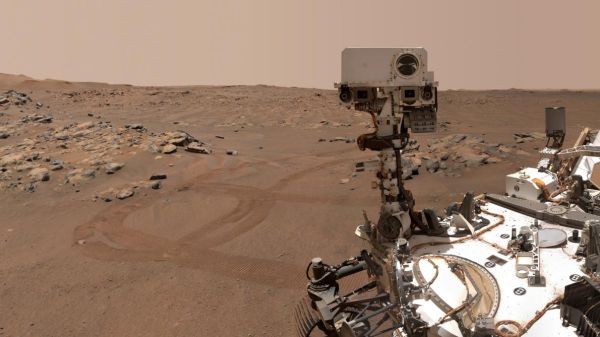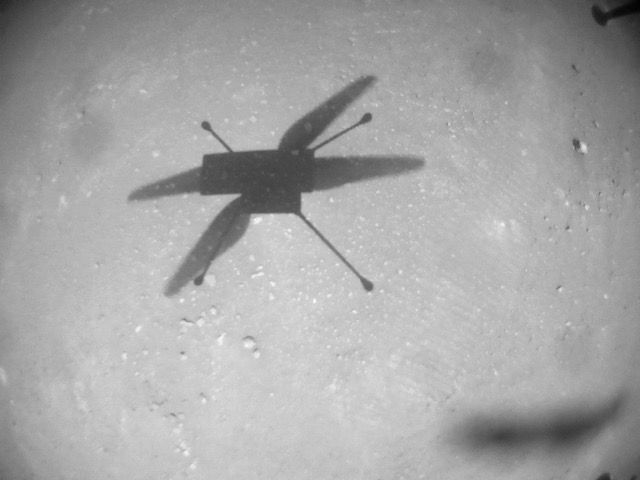After a 2021 filled with complex challenges and extraordinary successes, 2022 is shaping up to be another busy year for NASA.
Read MoreMonth: February 2022
NASA Television to Cover Space Station Cargo Launch, Docking
NASA Television will provide live coverage of the launch and docking of a Russian cargo spacecraft delivering almost three tons of food, fuel and supplies to the International Space Station.
Read MoreMark Vande Hei’s Window to the World
Astronaut Mark Vande Hei peers at the Earth below from inside the seven-windowed cupola, the International Space Station’s window to the world.
Read MorePaint it black: behind the James Webb Space Telescope’s signature color
NASA’s James Webb Space Telescope has to stay super cool to observe the cosmos. How does it beat the heat? Black paint. As the agency explained in its new YouTube series “Elements of Webb,” the James Webb Space Telescope‘s radiator is painted black to absorb heat. Just like how black asphalt gets hot in the summertime, objects that are black are generally hotter as they absorb all wavelengths of light and convert it into heat. (Comparatively, white objects reflect light and do not absorb heat.) Webb engineers use this principle…
Read MoreMars rover Perseverance sets distance record on the Red Planet
The Perseverance rover’s self-driving function is working just great on Mars, according to NASA’s Jet Propulsion Laboratory. The mission, not quite at one Earth year on Mars, has topped a new distance record for Red Planet rovers. On Friday (Feb. 4) Perseverance made the longest drive completed in a single Martian day, or sol, traveling 806.3 feet (245.76 meters), the rover’s Twitter feed reported. Previously that record was held by NASA’s Opportunity rover, which traversed 702 feet (214 meters) in a single day in 2015, according to NASA. “After a few months…
Read MoreMars helicopter Ingenuity aces 19th flight after historic Red Planet weather delay
The dust storm couldn’t keep NASA’s Mars helicopter Ingenuity grounded forever. The 4-pound (1.8 kilograms) Ingenuity aced a 100-second sortie on Tuesday (Feb. 8), its 19th Red Planet flight overall but its first since Dec. 15. The flight had originally been targeted for Jan. 5. But on New Year’s Day, a big dust storm kicked up near the 28-mile-wide (45 kilometers) Jezero Crater, which Ingenuity and its robotic partner, NASA’s Perseverance rover, have been exploring since February 2021. The Ingenuity team decided to stand down until the dust storm passed,…
Read MoreDaniel G. Nichols
Mathematician Daniel G. Nichols, who worked in the Real-Time Program Development Branch, Mission Planning and Analysis Division, is photographed in NASA’s Manned Space Center.
Read MoreThe Comfort and Delight of Celestial “Reruns”
Seeing the same target again has the comfort of a beloved rerun, while offering the opportunity for new discoveries. The post The Comfort and Delight of Celestial “Reruns” appeared first on Sky & Telescope.
Read MoreNASA Selects Developer for Rocket to Retrieve First Samples from Mars
NASA has awarded a contract to Lockheed Martin Space of Littleton, Colorado, to build the Mars Ascent Vehicle (MAV), a small, lightweight rocket to launch rock, sediment, and atmospheric samples from the surface of the Red Planet.
Read MoreAstra rocket aborts 1st Florida launch attempt at last second (video)
Astra came tantalizingly close today (Feb. 7) to its first-ever launch of operational satellites. The California company’s Launch Vehicle 0008 (LV0008) was scheduled to launch the ELaNa 41 mission for NASA today from Cape Canaveral Space Force Station in Florida. And it nearly happened: LV0008’s first-stage engines fired up at 1:50 p.m. EST (1850 GMT) as planned, but the rocket shut the liftoff attempt down almost immediately thereafter. After analyzing the issue, Astra decided not to attempt another launch during today’s window, which ran through 4 p.m. EST (2100 GMT).…
Read More
